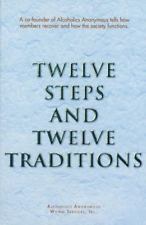
"Our public relations policy is based on attraction rather than promotion; we need always maintain personal anonymity at the level of press, radio, and films."

 |
Tradition Eleven "Our public relations policy is based on attraction rather than promotion; we need always maintain personal anonymity at the level of press, radio, and films." |
 |
This is the first of two Traditions involving the topic of personal anonymity. Tradition Eleven discusses it primarily with a view toward relations with Society at large, where Tradition Twelve treats it in a more spiritual and introspective manner.
"WITHOUT its legions of well-wishers, A.A. could never have grown as it has. Throughout the world, immense and favorable publicity of every description has been the principal means of bringing alcoholics into our Fellowship... It is no exaggeration to say that half of A.A.’s membership has been led to us through channels like these" (Page 180) This is discussed in some detail on pages 186-187 (Tradition Twelve). In addition to alcoholics and their families, doctors, clergymen and employers also contact the fellowship for information.
A responsibility fell upon the Founders to develop an effective public relations policy. Through painful experience they arrived at the practice codified in Tradition Eleven consisting of attraction rather than promotion. "Much of the political, economic, and religious life of the world is dependent upon publicized leadership. People who symbolize causes and ideas fill a deep human need." (Page 181) But being in the public eye is dangerous for alcoholics, many of whom have been ambitious self-promoters. A society of promoters was a frightening. Restraint, in the form of personal anonymity, was therefore seen as necessary for the individual, and beneficial for the fellowship. An antecedent to this Tradition can be found in the Foreword to the First Edition of the Big Book. The Founders cited concerns of overwhelming personal appeals for help and interference in their business affairs. Anonymity at that time was also motivated in part by the Founders' fears of exposure as alcoholics when that was still seen as a stigma. (Page 184-185, Twelfth Tradition )
The restraint developed within the fellowship produced more favorable publicity than the members could have generated on their own. One could say the press is "doing for us what we could not do for ourselves."
In the beginning, the press could not understand our re- fusal of all personal publicity... Then they got the point. Here was something rare in the world—a society which said it wished to publicize its principles and its work, but not its individual members. The press was delighted with this attitude. Ever since, these friends have reported A.A. with an enthusiasm which the most ardent members would find hard to match (Page 182)The author does not make this comparison, but one is reminded of the statement at the end of Tradition Seven (Page 165) that A.A.'s financial independence and lack of public fundraising drew praise in editorials and raised confidence in its integrity. Thus, the Traditions sometimes have practical benefits for A.A. in addition to the spiritual effects for which they were developed. At one point after the pioneering days of A. A., it was not unheard of for members to break their public anonymity. Most were well-intentioned, thinking they could use modern publicity methods to promote the fellowship. The Foundation (precursor of the General Service Board) sent letters to news organizations explaining A.A.'s idea of personal anonymity and policy of attraction over promotion. Since then the press has helped greatly in upholding the tradition of public anonymity, sometimes omitting names and photographs from news stories, for example.
The author concludes with a hint of the next Tradition:
To us, however, it [Tradition Eleven] represents far more than a sound public relations policy. It is more than a denial of self-seeking. This Tradition is a constant and practical reminder that personal ambition has no place in A.A. In it, each member becomes an active guardian of our Fellowship. (Page 183)